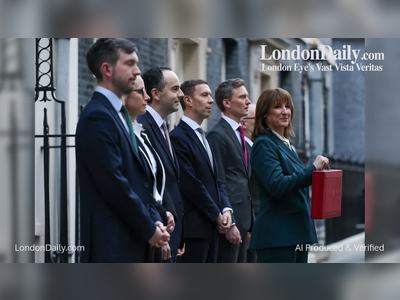Investors Rush Into UK Gilts and Sterling After Budget Eases Fiscal Concerns
Bond yields drop sharply and pound strengthens as markets welcome increased fiscal headroom under Reeves’ 2025 budget
Investors flocked to long-dated UK government bonds and the pound on Wednesday following the release of the 2025 budget, reacting positively to revised fiscal forecasts that restored confidence in Britain’s finances.
The yield on the 30-year gilt fell 11 basis points to 5.215 percent — the largest one-day drop since April — while sterling rose roughly 0.5 percent to $1.32295.
The surge in bond demand came after the independent budget watchdog concluded the government’s recent measures unlocked nearly £22 billion in “headroom” over the next five years — substantially more than markets had anticipated.
The result: investors interpreted the improved fiscal outlook as a signal that future borrowing and debt-servicing costs would be more manageable, prompting a rush into UK debt.
Major financial institutions shifted their stance on UK assets.
Some brokers closed euro-sterling short positions and turned bullish on both gilt yields and the currency, while global asset managers announced plans to re-enter the gilt market.
One large manager described the budget’s renewed fiscal prudence as a “selling point,” predicting lower long-term borrowing costs.
While government debt rallied, equities also benefitted.
The UK’s main stock index rose nearly one percent as market sentiment improved, helped by a sense that stability had returned after recent turbulence in bond and currency markets.
Nonetheless, some economists remain cautious.
They warn that the rally rests heavily on the assumption that new fiscal headroom will translate into sustainable debt management and that inflation and global interest-rate pressures will ease.
The reaction of gilts and sterling may be temporary should economic conditions sour or if future fiscal targets are missed.
For now, though, the budget appears to have calmed investor nerves — at least for the time being — reversing weeks of uncertainty and rekindling demand for UK government debt and the pound.
The yield on the 30-year gilt fell 11 basis points to 5.215 percent — the largest one-day drop since April — while sterling rose roughly 0.5 percent to $1.32295.
The surge in bond demand came after the independent budget watchdog concluded the government’s recent measures unlocked nearly £22 billion in “headroom” over the next five years — substantially more than markets had anticipated.
The result: investors interpreted the improved fiscal outlook as a signal that future borrowing and debt-servicing costs would be more manageable, prompting a rush into UK debt.
Major financial institutions shifted their stance on UK assets.
Some brokers closed euro-sterling short positions and turned bullish on both gilt yields and the currency, while global asset managers announced plans to re-enter the gilt market.
One large manager described the budget’s renewed fiscal prudence as a “selling point,” predicting lower long-term borrowing costs.
While government debt rallied, equities also benefitted.
The UK’s main stock index rose nearly one percent as market sentiment improved, helped by a sense that stability had returned after recent turbulence in bond and currency markets.
Nonetheless, some economists remain cautious.
They warn that the rally rests heavily on the assumption that new fiscal headroom will translate into sustainable debt management and that inflation and global interest-rate pressures will ease.
The reaction of gilts and sterling may be temporary should economic conditions sour or if future fiscal targets are missed.
For now, though, the budget appears to have calmed investor nerves — at least for the time being — reversing weeks of uncertainty and rekindling demand for UK government debt and the pound.









